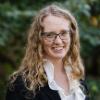A Historian's Perspective

At the heart of the historical discipline is a tension between the familiar and the strange. Our natural inclination when studying the past is to assume that those in the past are faded images of us today. That posture, however, leads to bad history. History leans into particularity. Those in the past were different from us. They lived in a different context and their assumptions about the world were different. Only when we acknowledge these differences can we really begin to understand people in the past. But historians’ work is only possible because there are universal elements of human experience. While leaning into the difference, historians are only able to do their work because there is some commonality between humans.
Like history, theater lives in this tension. One of the central questions we pondered in the CACE seminar this year was whose stories we can tell. This question highlights the interplay between the universal and the particular. In 1996, playwright August Wilson argued in his speech “The Ground on Which I Stand” that in theater, Black people’s particular experiences are so unique that they should be the only ones telling their stories. Wilson argues that African Americans’ identity is rooted in their common experiences, and that those who have not walked those paths cannot accurately interpret their stories. Speaking to those in the theater, he says “we can meet on the common ground of theatre as a field of work and endeavor. But we cannot meet on the common ground of experience.” Wilson argued that the particularity of African Americans’ stories are, however, a gift to all people because “all of human life is universal.” We need the particular to see the universal.
The particular can be a path to the universal, and perhaps it is only through the particular that we can find the universal. I think here of the incarnation. The Son humbled himself and was born in Bethlehem, raised in Nazareth, ministered in Judea, and was killed and then resurrected in Jerusalem. Through the particularity of life all of humanity can experience his love.
As a historian, my job is to tell other people’s stories. Every story I tell is someone else’s story. Wilson’s emphasis on the particularity of stories affirms the value of the individual, of context, and of difference. But I do not follow Wilson’s call. Though I have not literally walked in their shoes, I teach about people of color, especially African Americans. But if I let them, these stories can also become part of my own story, my own history. I see this happening in two ways.
First, when I am learning, writing, and teaching about saints from different cultures, I expand my implicitly tribal bounds of who “we” is. As a white person, my parents in the faith are not just white Christians from western contexts. They include John Perkins (the Black founder of the Christian Community Development Organization), Catherine de Hueck (a Russian refugee to America), Frederick Douglass, and Augustine. Similarly, I want my students’ understanding of “we” to expand to include Christians across space and time.
Second, I try to let the stories of people in the past implicate me, to let their stories ask me (and my students) the question: who do you say I am? History, like theater, can be a mirror. Mark Lewis reminded us of Shakespeare’s line in Hamlet in which Hamlet says the “purpose of playing” is “to hold as ‘twere the mirror up to nature: to show virtue her feature, to scorn her own image, and the very age and body of the time his form and pressure.” I want to learn from the past, to see myself and our culture more clearly.
At it’s best, doing history teaches its practitioners humility. We come to terms with how little we actually can say about why things happened. My own particularity, coupled with limited evidence and knowledge, makes the true stories I can tell about the past fundamentally different from God’s complete understanding of the past. As a white woman living in the twenty-first century, even with the knowledge I have about the time period I have studied for nearly two decades, I know I miss and misunderstand aspects of the people I study. My response to this deficiency is twofold. First, as my colleague Tracy McKenzie says, our limited ability to understand the past can lead us to awe at the God who sees all things and knows all things. Second, I lean into learning from other people’s perspectives.
The importance of being with people who are different from me came to the fore as I talked and played with my colleagues in the CACE seminar. I was struck by how different our approaches were to the questions we asked, the readings, and the plays. Our differences stemmed from our personal experiences and our professional training. And I remembered again that I needed to hear their perspectives, to learn from scientists, artists, social scientists, theologians, English faculty, communication experts, and more. They understood our collective readings and experiences differently, and I needed their particularity to better understand the universal.
